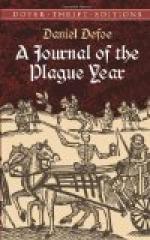But these extravagant reports were very prejudicial to our trade, as well as unjust and injurious in themselves; for it was a long time after the plague was quite over before our trade could recover itself in those parts of the world; and the Flemings[295] and Dutch, but especially the last, made very great advantages of it, having all the market to themselves, and even buying our manufactures in the several parts of England where the plague was not, and carrying them to Holland and Flanders, and from thence transporting them to Spain and to Italy, as if they had been of their own making.
But they were detected sometimes, and punished, that is to say, their goods confiscated, and ships also; for if it was true that our manufactures as well as our people were infected, and that it was dangerous to touch or to open and receive the smell of them, then those people ran the hazard, by that clandestine trade, not only of carrying the contagion into their own country, but also of infecting the nations to whom they traded with those goods; which, considering how many lives might be lost in consequence of such an action, must be a trade that no men of conscience could suffer themselves to be concerned in.
I do not take upon me to say that any harm was done, I mean of that kind, by those people; but I doubt I need not make any such proviso in the case of our own country; for either by our people of London, or by the commerce, which made their conversing with all sorts of people in every county, and of every considerable town, necessary,—I say, by this means the plague was first or last spread all over the kingdom, as well in London as in all the cities and great towns, especially in the trading manufacturing towns and seaports: so that first or last all the considerable places in England were visited more or less, and the kingdom of Ireland in some places, but not so universally. How it fared with the people in Scotland, I had no opportunity to inquire.
It is to be observed, that, while the plague continued so violent in London, the outports, as they are called, enjoyed a very great trade, especially to the adjacent countries and to our own plantations.[296] For example, the towns of Colchester, Yarmouth, and Hull, on that side[297] of England, exported to Holland and Hamburg the manufactures of the adjacent counties for several months after the trade with London was, as it were, entirely shut up. Likewise the cities of Bristol[298] and Exeter, with the port of Plymouth, had the like advantage to Spain, to the Canaries, to Guinea, and to the West Indies, and particularly to Ireland. But as the plague spread itself every way after it had been in London to such a degree as it was in August and September, so all or most of those cities and towns were infected first or last, and then trade was, as it were, under a general embargo, or at a full stop, as I shall observe further when I speak of our home trade.




